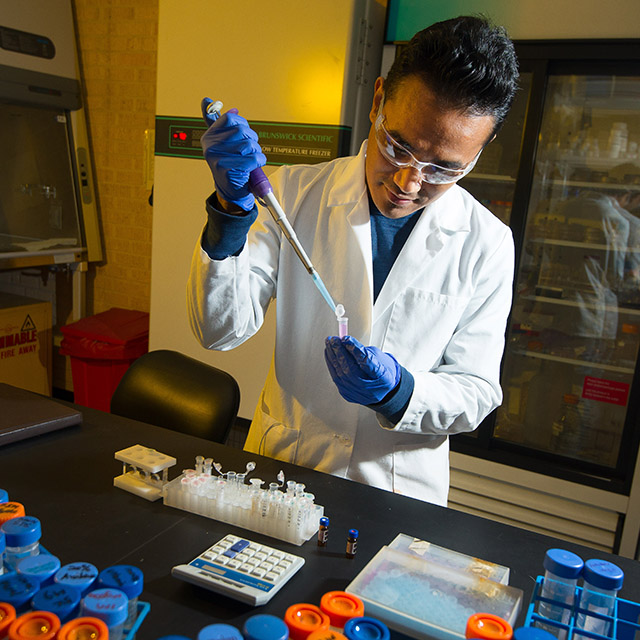Biochemistry
Explore the chemistry of living systems and the experimental techniques used to understand them.

While chemistry is often referred to as “the central science,” the impact on human health and our understanding of the natural world is best captured by biochemistry, which looks at living systems through the lens of molecules and their interactions.
As a biochemistry student, you’ll have opportunities to work on faculty-directed projects to help you create new chemical knowledge on some of today’s greatest challenges.
Contact
- chemistry@tcu.edu
- 817-257-5851
Programs Offered
Sample Courses
- Advanced Inorganic Chemistry
- Chemical Instrumentation
- Physical Chemistry I
- Quantitative Analysis
View Courses & Degree Requirements

Core Curriculum
Your success is at our Core. TCU’s Core Curriculum prepares you to live and work in today’s ever-evolving diverse and global society. It encourages you to be intellectually curious and ask big questions about the world and your place in it.
Special Admission Requirements
There are no special admissions requirements for this program.
Our Faculty
We’re a student-centered department committed to the teacher-scholar model. Our faculty, who are highly trained in their areas of specialization, conduct research — often with students by their sides — and are equally passionate about teaching. Meet our faculty.
What Sets Us Apart
Research plays a major role in the professional life of our tenure-track faculty. These research programs support our teaching mission and provide students with practical, hands-on training in world-class chemistry research.
Career Prospects
In addition to technical positions in industrial or governmental research labs, many chemistry graduates pursue advanced study in chemistry, medicine, law, journalism and business. While some biochemistry graduates take top entry-level jobs, most grads enter medical or dental school. TCU’s best biochemistry students often enter prestigious M.D. or Ph.D. programs, like Duke or Stanford, with the long-term goal of conducting biomedical research in a medical school setting.
Related Academic Programs

John V. Roach Honors College
Exceed your own expectations. Incoming and current undergraduate students of every major may apply. Unique classes are offered which connects students with a varied curriculum that is stimulating, supportive and cross-disciplinary.